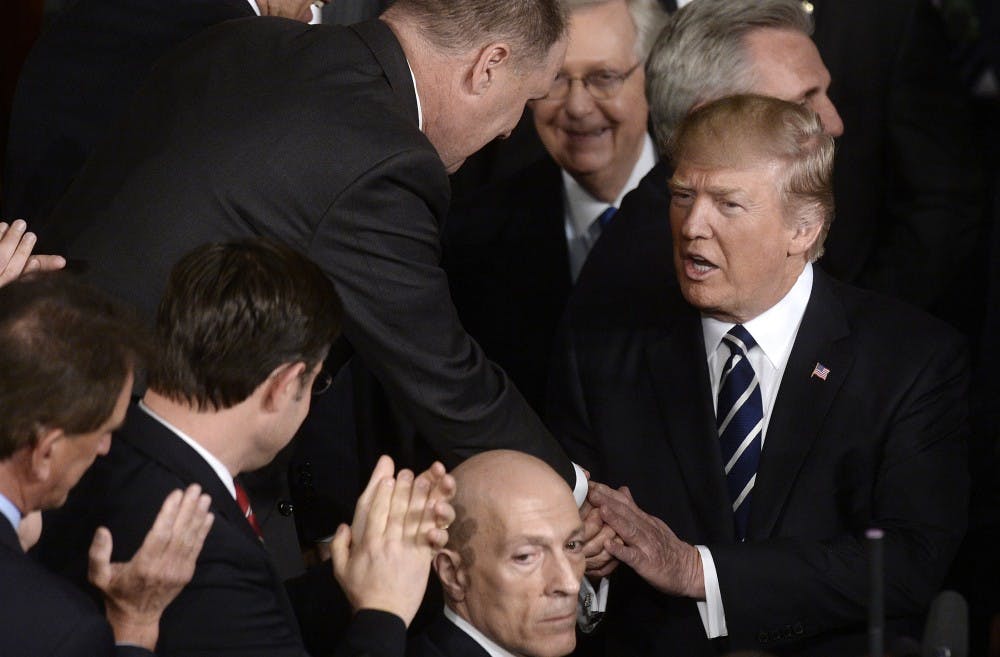Senate leader Mitch McConnell, R-Kentucky, has said in the past that Congress will work with the president on the border wall and estimates it will cost $12 billion to $15 billion, according to CNBC.
President Donald Trump delivered his first speech to Congress Tuesday with a softer tone than the public has seen throughout his campaign and appearances in the media as president.
He began his speech by touting what he has done so far as president, but his aim of the speech was to get members of Congress, both Democrats and Republicans, on board with his vision for the country.
Immigration and the border wall
The topic of the border wall and undocumented immigrants was one of the main talking points Trump had throughout the entirety of his address.
Trump claimed that the construction of a “great, great wall along our southern border” will begin soon and he believes enforcing immigration laws will help raise wages, create jobs, save money, make communities safer and limit the flow of drugs coming into the country.
“We’ve defended the borders of other nations while leaving our own borders wide open for anyone to cross and for drugs to pour in at now a unprecedented rate," Trump said.
The president also asked anyone in Congress who doesn’t believe in enforcing immigration laws to think about what they would say to an American family who “loses their jobs, their income or loved one because America failed to uphold its laws and defend its borders.”
Senate leader Mitch McConnell, R-Kentucky, has said in the past that Congress will work with the president on the border wall and estimates it will cost $12 billion to $15 billion, according to CNBC.
Health care
When it comes to the Affordable Care Act, Trump asked Congress to work with his administration to "save Americans from this imploding 'Obamacare' disaster.”
He urged Congress to repeal and replace the ACA with a five-part plan.
- Make sure Americans with preexisting conditions have access to coverage and create a transition from those who are currently receiving insurance from the ACA.
- Help Americans purchase their own coverage through tax credits and expanded health savings accounts.
- Give state governors resources and flexibility with medicaid to “make sure no one is left out.”
- Implement reforms that will protect doctors and patients from high costs. This includes bringing down the price of medicine.
- Allow Americans to purchase health insurance across state lines.
Trump also said his administration wants to implement paid family leave and invest in women’s health.
Infrastructure
The president asked Congress to approve legislation that will invest $1 trillion into the country’s roads, bridges, tunnels, airports and railways.
He believes the investment in infrastructure and the continuation of the construction of the Keystone and Dakota Access pipelines will help create more jobs.
Infrastructure is one of the issues that will likely garner bipartisan support.
Education
Trump described education as “the civil rights issue of our time” and urged Congress to pass a bill that funds school choice for “disadvantaged youth including millions of African American and Latino children.”
He thinks children should have the choice to go to public, private, charter, magnet, religious or home schools.
Funding the military
The new administration has called for an increase in military spending and the president said he would be sending a budget to Congress soon.
Trump's plan would increase military spending by $54 million. The funds for this are from nonmilitary programs that will be cut, according to The New York Times.
His budget also includes funds for veterans.
“Our veterans have delivered for this nation and now we must deliver for them," Trump said.
International relations
The president said institutions like the North Atlantic Treaty Organization will continue to have support from the United States, but their partners “must meet their financial obligations."
“My job is not to represent the world,” Trump said. “My job is to represent the United States of America.”
When it comes to the refugee crisis, Trump said he would like to create an atmosphere where refugees can go back home and start to rebuild.
It is currently unclear how the president would try and achieve that.
Student reactions
Ben Slightom, a junior architecture major, feels like the president was “grasping at straws” for Congress to unite with him.
“Nearly a full month and a half after his inauguration and blunder after blunder, it just seemed like he was trying to backtrack to an earlier place where he can’t really get back to," Slightom said.
One point Slightom agreed on with the president on was infrastructure, but he said he thinks the new administration should highlight water infrastructure.
Sabrina Kilgore, a freshman speech and language pathology major and the public relations chairwoman for the Ball State College Republicans, believes this was the best speech Trump has ever had.
“He seemed very in control, very level headed, he went in and knew exactly what he wanted to say,” Kilgore said.
Emily Hart, a graduate student studying natural resources and environmental management, said the speech was “less antagonistic” than his inauguration speech.
Hart did not agree with his speech though, and believes the president was minimizing what people on the left side of the political spectrum believe in.
Andrew Hammer, a junior economics major and the chairman of the Ball State College Republicans, felt like the president stayed on message in a "presidential manner."
Hammer said he personally agrees with the president on the issues of infrastructure, tax and regulation reform and economics.
You can read the full transcript of the president’s speech here.





